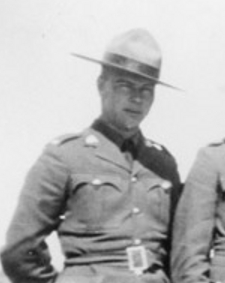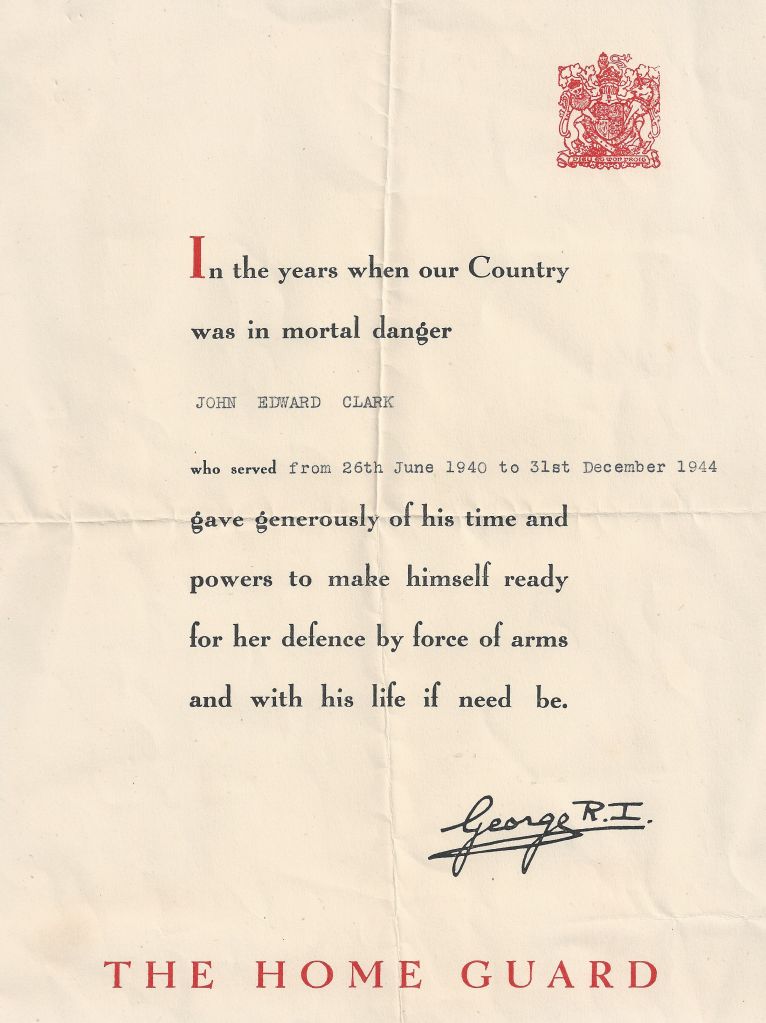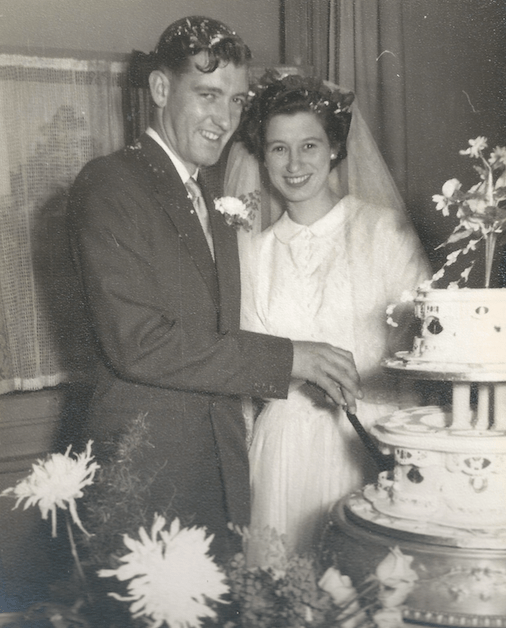My Mum, Jean, was born in 1930 and, before her death a couple of years ago, she wrote down her earliest memories. In Part 1 she told the story of her difficult early years in Eastbourne and how she lived with her grandparents in East Dean. This second part of her story records how she was adopted by her Auntie and Uncle in Hailsham and what it was like living in the town during the war years.
This is her story in her own words…
After Grandad’s death, Nannie stayed in the Bakehouse at East Dean with Aunt Dorothy. Aunt Dorothy worked for Miss Craddock a rich lady who lived in a big house at Little Hill. At the beginning of the war Miss Craddock had four girl evacuees from London to stay. They were two pairs of sisters. Mary and Doris were one pair but I can’t remember the other sisters names. They lived in the servants part of the house. There were quite a few evacuees from London in East Dean during the War. We played with them but didn’t go to school with them. Florrie worked as a maid for Lord John and Lady Salmond who lived at Grey Walls which is now a Residential Home.
During the War there were two sessions at school mornings or afternoons. The evacuees had one session and us local children had the other.

Nannie and Dorothy moved from the Bake House in 1954 when the Gilbert-Davis Estate wanted to sell it. They moved to Rose Cottage, 4, Upper Street on the village green.

I was nearly 9 years old when the war started and a few months later I went to live in Hailsham with Isabel’s sister Edie and her husband John.

We lived at 4, Gordon Road, Hailsham in a terraced house. You opened the front door and immediately you were in the front room, then down two steps to the kitchen where we mostly lived. The stairs went up the middle of the house and there was a front and back bedroom. The toilet was outside. Mum and I had our bath on a Friday night when Dad was at the Bricklayers Arms. It was a tin bath and when we finished we had to bail out the water which was back breaking. The bath was kept on a hook on the wall outside in the yard. There was a door at the back out to the yard. There was an outside toilet and a shed where bikes were kept. There was a small lawn and vegetable beds and an air-raid shelter.

There were just the three of us and then Eileen Neale came and lived with us. Her mother lived three doors away with her mother and her son Johnny. Eileen and I slept together in the back room.
Eileen and I went to school together at Grovelands Junior School, Grovelands Road, Hailsham. We always walked there taking our packed lunches. We walked through the fields, the Recreation Ground and along Western Road then up through the fields to the school. That was in the summer, but in the winter we walked via Summerfields Avenue and along the London Road. The school hours were 9am to 4pm. The school is knocked down now but they built a new one next to it. Many a time when we were walking to school a German plane flew over and started shooting. We all had to jump into a ditch for safety.

We had three air-raid shelters at school and we had to go in there when the planes came over. I remember Bill Vine who was one of the boys was given the job of standing on the roof of the shelter and listening for the ‘Cuckoo’ warning at Eastbourne. He would then blow a whistle and we would all get out our gas-masks and go into the shelters. There were cold concrete slabs to sit on and a smelly ‘Elsan’ chemical toilet at the end.
The shelters were cold and damp and dark but the teachers entertained us by reading books or reciting poetry.
The school was very patriotic. Every Empire Day we would all put bunches of daisies in our buttonholes and were tied up with red, white and blue ribbon. We all then had to march around the playing field and salute the Union Jack. Our headmistress was Miss Rouse and she wore her husband’s medals from the First World War on her breast.
We only had lady teachers because all the men had gone to fight. I remember Miss Coachworth, Miss Kidd and Mrs Jenner.
One day a German plane crash-landed on the Hailsham to Boship Road. All the children ran along Western Road, and under the main road where the cattle went. We saw the crashed fighter which had nose-dived into a field. The airman was dead and there was a lot of blood. We cheered and cheered. Now, I think it was someone’s son or husband, but at the time we thought it was one less plane to come and bomb us.
Sometimes at school we were taken out to pick hips and haws to make rose-hip syrup which was good for babies. We also went blackberrying to help fill the puddings for school dinners.
One day we walking home when we heard a plane flying low overhead. It was so low that we could see the pilot in the cockpit and waved at him. We then saw the iron cross on the plane and realised that it was German. He started to let his bombs out and they came down in the fields behind Gordon Road.
We had an Anderson Shelter in the back garden of our home and it was small and cramped. Sometimes we had to sleep in it all night. It was cold and when it rained we got wet. Because I was the smallest I had to sleep at the end. Sometimes if the sirens went we would shelter under the stairs as it was one of the safest places. It was also used as a pantry to store food. When the bombs dropped the whole house used to shake. Once a bowl of jelly in a basin got shaken off the shelf and fell on me. I had jelly all over me and a bump on the head.
We used to go to the pictures in George Street on Saturday afternoons. To make money I used to sell mint to the green-grocers and Eileen collected jam-jars. She got ½ d each at the Home & Colonial Store.

During the War we had a Canadian soldier come to our house. His name was Alf King and Dad met him at the Bricklayers Arms and bought him home. He was a lovely man and would bring us sweets and comics. (we only had a small amount of sweets and we had to use coupons for these) If he called and Dad wasn’t in, he would not come in but would wait outside for him; he was a real gentleman. He told us that he was a Canadian Mounted Policeman and was once shot at, in Alaska by the Mad Trapper. The Mad Trapper was killed in a fire and Alf was taken to hospital in an aeroplane. It was quite a story and he said that he was famous in Canada but our family took it with a pinch of salt.

Years later Mum and I watching television and there was a film about the Mad Trapper and we realised that Alf had told us the truth.
During the War years we ate quite well. Dad had an allotment and grew all the vegetables and soft fruit. He grew strawberries, gooseberries, potatoes, peas, runner beans and beetroot. He worked on the railway and the gang would borrow Bert Bonniface’s ferrets and usually got a few rabbits on the railway line. This helped with the situation with meat which was rationed. Dad had to give a couple of rabbits to Bert for the loan of the ferrets.
At this time I sometimes saw Jim Sainsbury, my father. He came to visit me but not often. He was supposed to pay ten shillings a week towards my upkeep but more often than not didn’t. By this time my real mother, Isabel was with another man, Jack Green and they had my sister Valerie.
During the War Dad (John Clark) was in the Home Guard at Hailsham and he had a soldiers uniform and a rifle. Once a week we would go with him to an ‘Ensa’ concert at the Congregational Hall by the Railway Bridge. We didn’t think much of these concerts as the lady singers had awful voices. Dad was supposed to guard the railway station on certain nights but he would often come home early as he said it was more important to look after his family than the railway. One day he was cleaning his rifle whilst guarding the railway station when he forgot that it was still loaded. The gun went off and took a chunk out of the wall. The damage was still there when the station was knocked down many years later.

Eileen and I used to go down to Vines Farm in Ersham Road every day in the summer. We would play with June Vine, Margery Weaver and Pam Sutton. We played in the barn, made mud cakes and decorated them and ‘helped’ with the haymaking. We had a lovely time.
At the weekends we sometimes went to see Nannie and Aunt Dorothy who had gone to live with Miss Craddock in Tongdean Road, Hove. One day we were on the platforms at Polegate Station (Isabel, Mum, Eileen, me and little Valerie) Mum and Isabel had gone down the steps to ring up Nannie to let her know we were on our way over when all of a sudden a load of German planes came and started dropping bombs. A young soldier on the platform gathered us all together and took us down the steps to the underpass for safety. That day quite a few people were killed and a lot of houses demolished.

Later in the War doodlebugs came over. They made a droning sound that suddenly cut off before they came down. I once stood on the wall outside the house and watched one go over. I forgot I was on a wall and stepped backwards into the passage. I hurt myself but I suppose I can say I got hurt in the war.
When I was eleven I had to sit for my scholarship. I did not pass because I didn’t want to go the Bexhill Grammar School. I thought they were snobs so I didn’t try. The Headmistress told my Mum that she couldn’t understand why I didn’t pass and then it came out that I didn’t try. As a result I went with Eileen to the big school in Battle Road.
I really enjoyed it at this school. One teacher was Mrs Piper and she had a son Michael and he came to school with her as he had picked up a butterfly bomb which had exploded. He lost his eye and one leg. He was very brave.
I left school at fifteen when the War finished. I should have left at fourteen like most of the others but I cried and told dad that I wanted to stay at school. I asked the Headmaster if I could stay on and he agreed. About ten of us stayed on for another year. Lessons were quite basic , English, arithmetic, P.E., art, history, geography and music. The history teacher also took music.
When the War finished Dad thought he should go to St Mary’s Church to say ‘Thank-You’ It was nearly empty and that was the only time he went to church.
My new Mum and Dad didn’t have any children. When I was 21 I changed my name to Clark which was their name and this was the name I used when I got married.

Following a difficult start, my mother lived a long and happy life with my father Roger. They settled in Polegate and later in Greys Road, Eastbourne where my father still lives. Eileen Neill was my godmother but married and emigrated to South Africa, however I am still in contact with her daughters, Kim and Sally.
I grew up believing that Edie and John Clark were my grandparents. It wasn’t until the death of Jean’s birth mother Isabel in 1981 that the whole family became aware of her true story. My Mum was a good Mum and lived past her 90th birthday. She died peacefully in 2022.

That was fascinating to read! we should all ask our parents to write down their stories! I certainly wish we had!
LikeLike
<
div dir=”ltr”>Beautiful… Honestly so lovely to read some of your lovely Mum’s memories. She certainly had gre
LikeLike
Thank you very much for sharing this remarkable story.
LikeLike
Great piece of family history thanks for sharing your mothers story.
LikeLike
My dad was Bill Vine so June my auntie. What a great read this has been. Thank you so much for posting it.
Sarah Wilson
LikeLike
Love reading these
Valerie was my aunt
She was married to my mums brother John (Rosemary Gausden later Cousins)
Met your mum many times – lovely lady
LikeLike